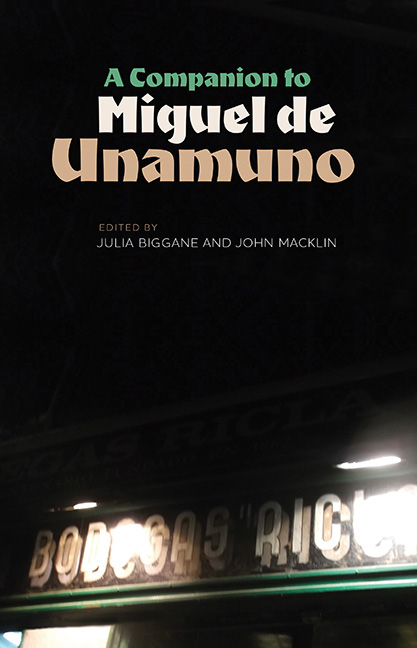8 - The Necessary Enemy or the Hated Friend: Self and Other in Unamuno
Published online by Cambridge University Press: 21 May 2021
Summary
Unamuno's theorization of ‘envidia’ [envy], like so many other aspects of his imaginative world, is far from straightforward. His vision of interpersonal rivalry suggests that, at its best, it can play a vivifying role in the life of both the individual and the community, helping the former to define him-or herself in the context of the latter, giving rise to compassion, and fellow-feeling. And yet he also believed envy to be a torpid, knee-jerk response to those around us, one produced by a spiritual death in life that he made it his mission to circumvent through his public role and published writings. He had, in that sense, taken very much to heart Kierkegaard's injunction that ‘The very maximum of what one human being can do for another in relation to that wherein each man has to do solely with himself, is to inspire him with concern and unrest’ (1968: 346).
We find the former of these attitudes epitomized in his first, and subsequently atypical, novel, Paz en la guerra, and in his most important philosophical exploration of faith and doubt, Del sentimiento trágico de la vida. The latter, destructive vision of envy, on the other hand, he explores most clearly in the celebrated diagnostic essay ‘La envidia hispánica’ [Hispanic Envy] (1909), written in response to Alcides Arguedas's study of Bolivian society, Pueblo enfermo [An Ailing People] (1909). There, Unamuno argues that the fatal cancer of envy, identified by Arguedas as endemic throughout the Latin American country, is no more than a lingering hangover from imperial rule: hatred of others’ success, resentment of any departure from stifling social norms, an unremitting urge to denigrate even those one professes to admire, all of these pernicious traits Unamuno sees as coterminous with Spanish – and hence Hispanic – social life. Such ‘íntima gangrena’ [intimate gangrene] is born of ‘ociosidad espiritual’ [spiritual idleness]: it was central to his role as a public intellectual that he wished to live a life combating this particular social ill and also that as a creative writer he should develop an understanding of how fictional and dramatic works might be harnessed to help in that same endeavour.
- Type
- Chapter
- Information
- A Companion to Miguel de Unamuno , pp. 153 - 174Publisher: Boydell & BrewerPrint publication year: 2016



